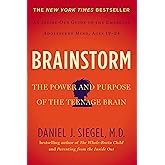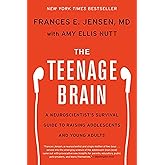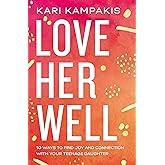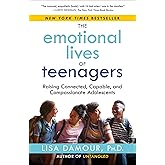Buy new:
Save with Used - Good

Download the free Kindle app and start reading Kindle books instantly on your smartphone, tablet, or computer - no Kindle device required.
Read instantly on your browser with Kindle for Web.
Using your mobile phone camera - scan the code below and download the Kindle app.



 Audible sample
Audible sample Follow the authors
OK
How to Talk So Teens Will Listen and Listen So Teens Will Talk Paperback – August 22, 2006
Purchase options and add-ons
- Print length203 pages
- LanguageEnglish
- Publication dateAugust 22, 2006
- Dimensions5.31 x 0.5 x 8 inches
- ISBN-100060741260
- ISBN-13978-0060741266
Book recommendations, author interviews, editors' picks, and more. Read it now.

Explore your book, then jump right back to where you left off with Page Flip.
View high quality images that let you zoom in to take a closer look.
Enjoy features only possible in digital – start reading right away, carry your library with you, adjust the font, create shareable notes and highlights, and more.
Discover additional details about the events, people, and places in your book, with Wikipedia integration.
Frequently bought together

More items to explore
Editorial Reviews
From the Back Cover
The renowned #1 New York Times bestselling authors share their advice and expertise with parents and teens in this accessible, indispensable guide to surviving adolescence.
Adele Faber and Elaine Mazlish transformed parenting with their breakthrough, bestselling books Siblings Without Rivalry and How to Talk So Kids Will Listen & Listen So Kids Will Talk. Now, they return with this essential guide that tackles the tough issues teens and parents face today.
Filled with straightforward advice and written in their trademark, down-to-earth style sure to appeal to both parents and teens, this all-new volume offers both innovative, easy-to-implement suggestions and proven techniques to build the foundation for lasting relationships. From curfews and cliques to sex and drugs, it gives parents the tools to help their children safely navigate the often stormy years of adolescence.
About the Author
Adele Faber and Elaine Mazlish are internationally acclaimed, award-winning experts on adult-child communication. Both lecture nationwide, and their group workshop programs are used by thousands of groups throughout the world to improve communication between children and adults.
Excerpt. © Reprinted by permission. All rights reserved.
How to Talk so Teens Will Listen and Listen so Teens Will
By Adele FaberHarperCollins Publishers, Inc.
Copyright ©2006 Adele FaberAll right reserved.
ISBN: 0060741260
Chapter One
Dealing with Feelings
I didn't know what to expect.As I ran from the parking lot to the school entrance, I held on tightly to my blowing umbrella and wondered why anyone would leave a warm home on such a cold, miserable night to come to a workshop on teenagers.
The head of the guidance department greeted me at the door and ushered me into a classroom where roughly twenty parents sat waiting.
I introduced myself, congratulated them all for braving the bad weather, and distributed name tags for everyone to fill out. As they wrote and chatted with one another, I had a chance to study the group. It was diverse -- almost as many men as women, different ethnic backgrounds, some couples, some alone, some in professional attire, some in jeans.
When everyone seemed ready, I asked people to introduce themselves and tell us a little about their children.
There was no hesitation. One after the other, parents described kids who ranged in age from twelve to sixteen. Almost everyone commented on the difficulty of coping with teenagers in today's world. Still, it seemed to me people were being guarded, holding back, making sure they didn't disclose too much too soon to a room full of strangers.
"Before we go any further," I said, "I want to assure you that anything we discuss here will be confidential. Whatever is said within these four walls remains here. It's no one else's business whose kid is smoking, drinking, playing hooky, or having sex a lot earlier than we'd wish. Can we all agree to that?"
Heads nodded in assent.
"I see us as partners in an exciting venture," I went on. "My job will be to present methods of communication that can lead to more satisfying relationships between parents and teenagers. Your job will be to test these methods -- to put them into action in your home and report back to the group. What was or wasn't helpful? What did or didn't work? By joining forces, we'll determine the most effective ways to help our kids make that tough transition from childhood to adulthood."
I paused here for the group's reaction. "Why does it have to be a 'tough transition'?" a father protested. "I don't remember having such a hard time when I was a teenager. And I don't remember giving my parents a hard time."
"That's because you were an easy kid," said his wife, grinning and patting his arm.
"Yeah, well maybe it was easier to be 'easy' when we were teenagers," another man commented. "There's stuff going on today that was unheard of back then."
"Suppose we all go back to 'back then'," I said. "I think there are things we can learn from our own adolescence that might give us some insight into what our kids are experiencing today. Let's start by trying to remember what was best about that time in our lives."
Michael, the man who had been the "easy kid," spoke first. "The best part for me was sports and hanging out with friends."
Someone else said, "For me it was the freedom to come and go. Getting on a subway by myself. Going to the city. Getting on a bus and going to the beach. Total fun!"
Others chimed in. "Being allowed to wear high heels and makeup and that whole excitement over boys. Me and my girlfriends would have a crush on the same guy, and it was, 'Do you think he likes me or do you think he likes you?'"
"Life was so easy then. I could sleep till noon on weekends. No worries about getting a job, paying the rent, supporting a family. And no worries about tomorrow. I knew I could always count on my parents."
"For me it was a time to explore who I was and experiment with different identities and dream about the future. I was free to fantasize, but I also had the safety of my family."
One woman shook her head. "For me," she said ruefully, "the best part of adolescence was growing out of it."
I looked at her name tag. "Karen," I said, "it sounds as if that wasn't the greatest time in your life."
"Actually," she said, "it was a relief to be done with it."
"Done with what?" someone asked.
Karen shrugged before answering. "Done with worrying about being accepted...and trying too hard...and smiling too hard so people would like me...and never really fitting in...always feeling like an outsider."
Others quickly built upon her theme, including some who only moments before had spoken glowingly of their teen years:
"I can relate to that. I remember feeling so awkward and insecure. I was overweight back then and hated the way I looked."
"I know I mentioned my excitement over boys, but the truth is, it was more like an obsession -- liking them, breaking up with them, losing friends because of them. Boys were all I ever thought about, and my grades showed it. I almost didn't graduate."
"My problem in those days was the pressure I was under from the other guys to do stuff I knew was wrong or dangerous. I did a lot of stupid things."
"I remember always feeling confused. Who am I? What are my likes? My dislikes? Am I true or am I a copycat? Can I be my own person and still be accepted?"
I liked this group. I appreciated their honesty. "Tell me," I asked, "during those roller-coaster years, was there anything your parents said or did that was helpful to you?"
People searched their memories.
"My parents never yelled at me in front of my friends. If I did something wrong, like coming home really late, and my friends were with me, my parents waited until they were gone. Then they'd let me have it."
"My father used to say things to me like, 'Jim, you have to stand up for your beliefs...When in doubt, consult your conscience...Never be afraid to be wrong or you'll never be right.' I used to think, 'There he goes again,' but sometimes I really did hang on to his words."
Continues...
Excerpted from How to Talk so Teens Will Listen and Listen so Teens Willby Adele Faber Copyright ©2006 by Adele Faber. Excerpted by permission.
All rights reserved. No part of this excerpt may be reproduced or reprinted without permission in writing from the publisher.
Excerpts are provided by Dial-A-Book Inc. solely for the personal use of visitors to this web site.
Product details
- Publisher : William Morrow Paperbacks
- Publication date : August 22, 2006
- Edition : Reprint
- Language : English
- Print length : 203 pages
- ISBN-10 : 0060741260
- ISBN-13 : 978-0060741266
- Item Weight : 2.31 pounds
- Dimensions : 5.31 x 0.5 x 8 inches
- Part of series : How To Talk
- Best Sellers Rank: #18,387 in Books (See Top 100 in Books)
- #7 in Popular Adolescent Psychology
- #22 in Parenting Teenagers (Books)
- #40 in Parenting Girls
- Customer Reviews:
About the authors

Adele Faber is an internationally acclaimed, award-winning expert on adult-child communication. She lectures nationwide, and her group workshop programs are used by thousands of groups throughout the world to improve communication between children and adults.

Discover more of the author’s books, see similar authors, read book recommendations and more.
Customer reviews
Customer Reviews, including Product Star Ratings help customers to learn more about the product and decide whether it is the right product for them.
To calculate the overall star rating and percentage breakdown by star, we don’t use a simple average. Instead, our system considers things like how recent a review is and if the reviewer bought the item on Amazon. It also analyzed reviews to verify trustworthiness.
Learn more how customers reviews work on AmazonCustomers say
Customers find the book effective for communication with teens, providing great advice and practical tips for opening up dialogue. Moreover, the book is easy to read and implement, with clear examples and cartoons illustrating good ways to communicate. Additionally, they appreciate its value for money and consider it a must-read for teachers.
AI Generated from the text of customer reviews
Select to learn more
Customers appreciate the book's communication strategies, particularly its methods for understanding and talking to teens, and its tips for opening up dialogue.
"Insightful. While I thought we were doing a good job it turns out we were doing the best we knew how to do...." Read more
"...I found this book to be very enlightening, informative, encouraging, insightful...." Read more
"Nice layout and explanations...." Read more
"...too late, but it really does work and has been very good for our mother/daughter relationship!" Read more
Customers find the book practical and useful in everyday life, providing helpful tips and effective techniques.
"...to seek solutions to everyday conflicts, which is all applicable and helpful...." Read more
"Practical, down-to-earth and kind advice for parents looking to communicate better with their teenagers. A great book to keep on the reference shelf." Read more
"...This book continues in the same vein and is very useful because teenagers can be frustating. I also relied upon "Siblings without Rivalry"...." Read more
"I found some useful ideas, and language, to use with my teen son...." Read more
Customers find the book easy to read and implement, appreciating its simple and understandable approach.
"Simple examples, easy to read. Pointed out in a simple way how I was doing everything wrong as a parent to my teenager...." Read more
"...Easy to read and I was able to finish it easily in one day." Read more
"This book is an easy read, and the communication techniques make absolute sense...." Read more
"Good book, full of helpful information. Easy read...." Read more
Customers appreciate the book's illustrations, which include cartoons showing good ways to communicate and real-life examples.
"...behavioral problems etc, I found this book gives the best advice, examples and practical solutions. It works!!..." Read more
"Nice layout and explanations...." Read more
"Excellent CD!! Fantastic ideas and principles for working with our children in a positive, healthy way...." Read more
"This book is well written and gives great real-life examples. It's my go to reference now when I have a situation." Read more
Customers find the book invaluable.
"...It reaches across the board of age, economic status, ethnicity and sexual preference on how to communicate in relationships...." Read more
"...with their book "How to talk so kids will listen.." are priceless. I recommend, or buy them, for many of my coaching clients...." Read more
"...It's money well spent and worth every dime." Read more
"...Poorly written. OK for the price." Read more
Reviews with images
Damaged
Top reviews from the United States
There was a problem filtering reviews. Please reload the page.
- Reviewed in the United States on May 19, 2024Format: PaperbackVerified PurchaseDifficult time for kids at that age group & a scary time for parents who want open communication to help get one another thru it!! It is possible & a great tool to see things from another perspective. It’s a first of its kind to have a means to understand EACH ONES viewpoints without clashing all the time & feeling heard!! Wish this was around in those difficult teen years & give it as a gift to anyone who is struggling as a parent!
I’m very Blessed that my girls are healthy, happy & involved Great Mom’s in their kids lives!!
- Reviewed in the United States on July 9, 2015Format: KindleVerified PurchaseUsed the suggested techniques for the first time and they worked flawlessly. The first time I used the book's suggestions, I had to sit down our 16 year old to explain that he would not be able to have his own car or even drive our cars. I opened the discussion by letting him know we understand how important having his license and driving is to him and that it's something he's been looking forward to for a long time. We explained that we will support him 100% in getting his license, but we aren't comfortable giving him sole use of our vehicles or buying him a vehicle because we are not willing to take on the financial liability. We explained, we would continue to support him in saving his money, help him to shop around when the time was right for a car and for insurance, etc. And that come prom, we would even be willing to pay for a driving service so that he didn't have to worry about that either. He took the news extremely well even though he was disappointed. To my surprise, the next day he even did extra chores around the house without being asked! The discussions then and afterwards on the topic were calm and respectful from both sides. It was amazing. Highly recommend this book! It challenged me to think think about life from the perspective of the teen, and if forced me to be mature which is what I want to exemplify to him in the first place.
- Reviewed in the United States on November 3, 2024Format: PaperbackVerified PurchaseSo I'm not knocking the authors here...this book is compassionate and intelligent and the overall ideology is very sound and it's probably my fault for not considering the publishing date (2005). It recommends things like regulating our own emotional responses to our teens behaviors, teaching them to identify and regulate their feelings, and working together to seek solutions to everyday conflicts, which is all applicable and helpful.
However, the language and examples given reflect a different generation of both parents and kids. Things that drove MY parents crazy (like my rock 'n roll music being too loud) aren't problems for me at all, and the complex issues modern parents and teens now face (social media interaction and regulation, post-pandemic mental health concerns, anxiety over political and social differences) are, of course, not discussed yet.
As a Gen X parent of a Gen Z teen, I respect and appreciate the ideas behind this book but just don't find them applicable in this era. I would love an updated version!
- Reviewed in the United States on January 19, 2024Format: PaperbackVerified PurchaseI loved the advice that this book provides for parents. The drawings/cartoons are nice too because they helped me imagine possible scenarios. I recommend this book for any parent who has even occasional and/or moderate conflict w a teenage child. I used some of the strategies with my 18 year old boy—for example, I just listened and said “mmm” or “sounds rough” and refrained from giving him advice when he was complaining about something. At the end of the conversation he actually thanked me and said it felt good to talk with me!!
- Reviewed in the United States on January 17, 2018Format: PaperbackVerified PurchaseI love all the Faber/Mazlish books and think they are essential basic reading for everyone, but especially parents. If you have the time and patience, I recommend starting with their first book, Liberated Parents/Children Your Guide to a Happier Family. It delves into the thought process behind this approach to parenting in a semi-entertaining way. Having this background makes it much easier to practice the skills taught more thoroughly in the "How to Talk" books and the "Siblings without Rivalry" book. The Liberated Parents & Siblings books are told in a story form approach, making them more interesting and heart-warming. How to Talk cuts straight to the heart of the matter to teach skills both by explanation and example. All are good, start with whichever you feel you need most. I have 9, 12, and 14 year olds, and every time I find myself frustrated I realize I've deviated from these parenting skills. Returning to them fixes the situation more often than not. It's amazing how much better of a parent I am with this approach, which doesn't come naturally to me. I fall off the wagon all the time, but am so glad to have this to come back to when we're having challenges. Thank you to these wonderful authors!
- Reviewed in the United States on January 26, 2024Format: KindleVerified PurchaseThese tools will not always work - but they DO work often, and frankly, that’s good enough for me. My tweens are becoming teens and I am implementing some strategies I should have long ago - hopefully they will continue to help us as a family like they have been so far.
- Reviewed in the United States on March 5, 2021Format: PaperbackVerified PurchaseI am a therapist and ordered this book so that I could get a sense of whether or not I would recommend it to the parents of my teenage clients (I am not a parent myself). Overall, I found the book enjoyable to read with plenty of relatable examples and tangible strategies for approaching conflict in a constructive way. However, I was very disappointed in the final chapter of the book by some of the author's comments regarding how a parent reacts to their child being gay. On page 178, she writes "Coming to terms with a teenager's homosexuality is never easy for any parent." This type of language and rhetoric reinforces the idea that to be gay is problematic and reveals some of the author's personal bias against LGBTQ folks. I do think it is important that parents are provided with tools and resources for ensuring that they are able to have supportive conversations with their children about sexuality, bu this one section of the book needs to be updated to reflect more inclusive language that does not connect gayness with something to be feared or dreaded by parents.
Top reviews from other countries
-
 HAPEReviewed in France on February 5, 2014
HAPEReviewed in France on February 5, 20145.0 out of 5 stars Apprendre à communiquer avec son ado
Format: PaperbackVerified PurchaseAgréable découverte d'Adèle Faber qui nous vient du Canada. Le livre nous plonge au milieu d'un groupe de travail, ce qui lui donne un caractère très pratique. Il est accompagné de planches de bd de mise en situation afin d'expliquer le comportement que les parents adoptent en général et celui qu'il faudrait adopter. Il y a en fait beaucoup de choses logiques dans cet ouvrage, mais auxquels nous ne pensons pas forcement. Nous avons tendance à vouloir absolument "gouverner" nos enfants en pensant en même temps les protéger, alors que nos ados, qui sont en train de se transformer, ont essentiellement besoin qu'on les écoute et qu'on leur parle comme l'on parlerait à un jeune adulte, plutôt que leur imposer des directives sans explication et d'un ton pas toujours aimable.
C'est un must have, que l'on doit garder en permanence sur sa table de chevet.
Le livre est en anglais, mais assez digeste. Pas de difficulté particulière pour le comprendre.
 BonneMaman69Reviewed in the United Kingdom on August 19, 2024
BonneMaman69Reviewed in the United Kingdom on August 19, 20245.0 out of 5 stars Really useful book
I bought this book to help me understand and communicate with my 15 year old son. Our conversations can be a bit tense and I wanted to have less confrontational interactions. It's not a magic wand but it does give some really practical advice and has helped me understand a bit better how he thinks. Very user friendly so will definitely keep referring it in the future. Highly recommend it to any parent trying to achieve more productive and peaceful interactions with their teenager(s)!
 montseReviewed in Spain on August 19, 2020
montseReviewed in Spain on August 19, 20205.0 out of 5 stars An excelent book
Format: KindleVerified PurchaseThat is an excellent book . A very useful guide to use everytime we need it.The cartoons are a tool to express something quick and easy. I truly recommend it.
 SusanReviewed in Canada on February 14, 2025
SusanReviewed in Canada on February 14, 20255.0 out of 5 stars Worth the time
Format: KindleVerified PurchaseAn excellent book to guide parents in the raising of their teens. Easy to read, with practical ideas and examples throughout!
 MonikaReviewed in India on March 11, 2025
MonikaReviewed in India on March 11, 20255.0 out of 5 stars Great
Great book


















